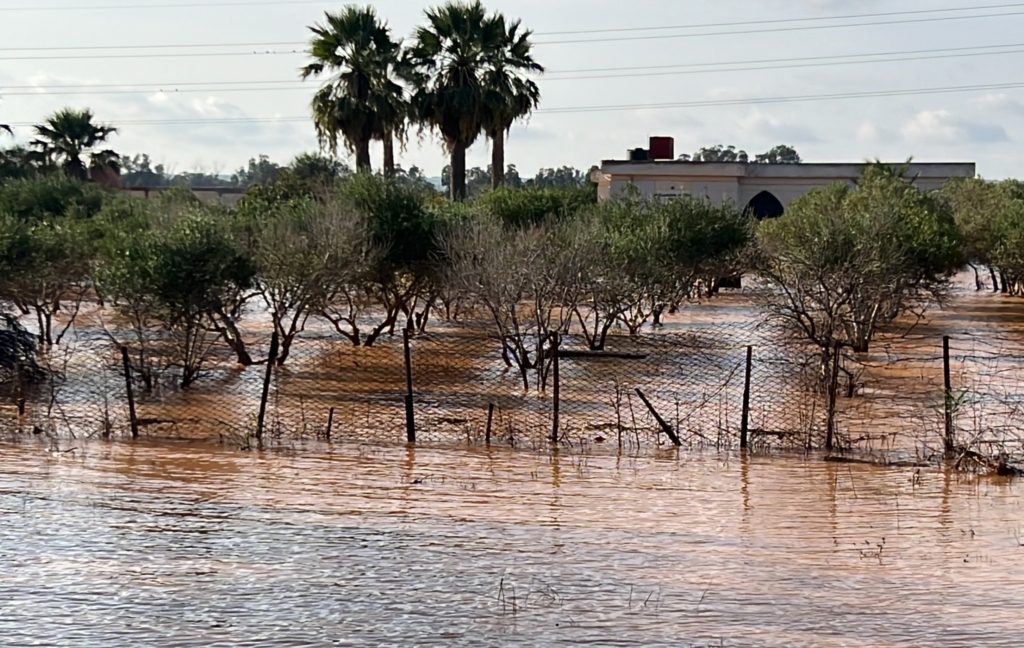
From the onset of the crisis, journalists reported the need for security clearance and other access restrictions and interference in their work by LAAF affiliates. Two Libyan journalists told Amnesty International that local officials stopped and interrogated them on 14 September, before ordering them to leave the city. On 16 September, an activist from Derna was arrested after he gave an interview about the situation the city to a channel perceived as opposed to LAAF, according to relatives. After protests in Derna on 18 September, LAAF ordered journalists to leave the city, reversing their decision the next day but instructing remaining journalists not to approach rescue teams. Journalists consistently reported being followed by LAAF’s military media agents and witnessed interpreters being asked by officials not to translate content critical of the authorities.
A UN spokesperson told media on 19 September that a UN team was “not authorized to proceed” to Derna, while confirming that rescuers and humanitarian workers present in Derna were allowed to continue operating. Amnesty International also received reports about delays of aid reaching some affected areas, in part due to the plethora of checkpoints established by LAAF and about medical teams from western Libya and at least one international rescue team being instructed to leave.
Calls for accountability are growing among survivors and human rights defenders in the aftermath of the floods following years of poor governance and mismanagement by rival governments and the free reign of militias and armed groups prioritizing their self-interest over the lives and wellbeing of civilians in Libya. While the Tripoli-based Public Prosecutor visited Derna and announced investigations, the prevailing climate of impunity in Libya raises serious concerns around the Libyan justice system’s ability and willingness to deliver truth and justice.
“We have been consistently calling for an independent international investigative mechanism on the human right situation in Libya. In the absence of any meaningful prospects for accountability at the national level, there is an urgent need to establish the facts and circumstances surrounding the staggering loss of life and destruction in the wake of Storm Daniel. This includes examining whether Libyan authorities and those in de facto control of affected areas failed to protect the population’s rights to life, health and other human rights,” said Diana Eltahawy.
There is an urgent need to establish the facts and circumstances surrounding the staggering loss of life and destruction in the wake of Storm Daniel. This includes examining whether Libyan authorities and those in de facto control of affected areas failed to protect the population´s rights.
Diana Eltahawy, Amnesty International’s Deputy Regional Director for the Middle East and North Africa
Powerful commanders and members of militias and armed groups reasonably suspected of committing crimes under international law since the 2011 armed conflict have not only enjoyed total impunity, but have also been integrated into state institutions and received state funding. LAAF’s harsh response to protests and criticism further exposes their unwillingness to secure truth, justice and reparation for victims.
Libya has been engulfed in armed conflict and political divisions since 2011, with parallel governments supported by unaccountable militias and armed groups claiming legitimacy. LAAF controls and carries out government-like functions in Benghazi, the second-largest city in Libya, and large swathes of eastern and southern Libya. LAAF’s use of brutal tactics to stifle dissent, restrict independent civil society and maintain their iron grip on power is well documented. On 11 September, disaster hit Derna, Sousse, Bayada, and other areas in the Green Mountain, after Storm Daniel (a Mediterranean tropical-like cyclone known as a medicane) triggered the collapse of two dams in the city of Derna, which had not undergone maintenance for decades. Amnesty International has called for prompt global mobilization to support rescue and rehabilitation efforts in all affected communities without discrimination, paying special attention to at-risk groups, including refugees, migrants, IDPs, and others facing multiple and intersectional forms of discrimination.
LAAF and its affiliated armed groups and security forces prevented hundreds of Tawerghans from returning to a Benghazi IDP camp, where they had lived for years and from where they were evacuated on 10 September ahead of the storm. According to activists, other residents were allowed to return to their homes in the same area.
Tags: Libya, Human Rights, Liberty of expression.
Cuba: The State represses women human rights defenders
Afghanistan: Accountability Mechanism Marks Historic Moment
Israel/OPT: Bank activist Awda Al-Hathaleen demands justice and accountability
Georgia: Court order on five independent NGOs a blow to freedom of association
Honduras: Authorities must to guarantee justice for the murder of Juan López
Contact Us
Regional - Américas
Calle Luz Saviñón 519, Colonia del Valle Benito Juárez, 03100. Ciudad de México, México
Global
1 Easton Street, London WC1X 0DW. Reino Unido.